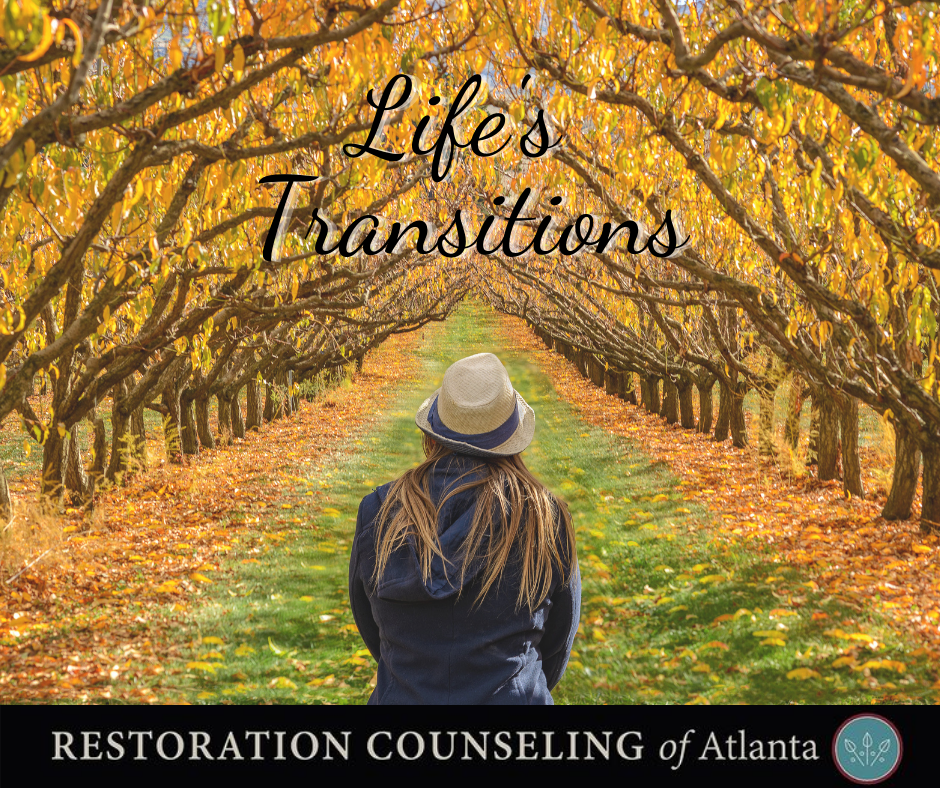If you have been to a playground, you have most likely heard a parent yell out to their child, “10 more minutes,” followed by “five minutes,” before they eventually warn their child, “one more minute until we leave.” Or maybe you have been that parent, warning your child of the inevitable: our time at the park is up. Have you ever wondered why parents give these countdown warnings to their kids? This technique helps a child transition from one activity to another as it helps them prepare for an upcoming change. It gives their developing brain time to process the concept of ending their playtime at the park and transitioning to their ride home.
Merriam-Webster dictionary defines transition as “a change from one state or condition to another.” A life transition is any change that impacts your life in a significant way. You may find yourself letting go of something and moving towards something else. In his famous book, Transitions, Psychologist William Bridges explains that they often begin with an ending and end with a beginning. The space between each ending and beginning is known as no man’s land and can be filled with uncertainty and unpredictability. These challenges can also bring doubt and insecurity through unstable times. Bridges highlights that the fundamental challenge with transitions is that we often feel incompetent to manage the change as we move away from the unexpected. We feel this way because our transitions change our circumstances and routines into something we never expected. In other words, we may be caught off guard and feeling unprepared.
Life Is Full of Transitions
Like kids, I think as adults, we could also benefit from having some time to plan for and process an upcoming transition. Although we may not always get a fair warning of unexpected changes, there are some transitions we can foresee coming and plan for.
Examples of some common life transitions:
- Welcoming a new baby or child
- A physical move
- Becoming empty nesters
- Transitioning your child/adult relationship to an adult/adult relationship with your grown children
- Starting a new marriage
- Ending a marriage
- Retiring
- Parenting Stages
- Changing jobs or careers
- Leaving home for college/ Living on your own for the first time
- Reparenting the adult within you
- Making the transition from college to career
Change may be hard, but it is also inevitable. It is your choice on how you adjust during this season. You can choose to dig your feet into the ground stubbornly, or you can take control of your life and make lemonade!
Accepting the Challenge
“You can’t start the next chapter of our life if you keep re-reading the last one.”
– Author Unknown
Once you are ready to accept the challenge and stop re-reading the last chapter, you can feel empowered to create the life you want, despite your circumstances. An important first step in acceptance is to recognize what you can control in the situation. First-time parents, who are anxiously awaiting the arrival of their baby, may not be able to control the timing of delivery. Still, they can focus on preparing their house and packing their hospital bag to be ready when the time comes. A simple shift of focus to what we can control empowers us to act rather than being limited by things outside of our control.
Changes or life transitions are opportunities for growth. Ask yourself how you want to grow through the transition. Dream and envision what life could look like on the other side of this circumstance. It is normal for times of uncertainty to bring about doubt and questions. Therefore, it may be an excellent time to reevaluate priorities, purpose, and values in your life.
“When we are no longer able to change a situation—we are challenged to change ourselves.”
– Victor E. Frankl
Adopt a “Both-And” Mindset
If you’ve ever experienced grief, you may be aware of the internal battle of “both-and.” Through your sadness, you find yourself laughing, and you struggle to accept that it is okay to be happy again. Rather than limit your thinking to a “this or that” mentality, it is important to embrace the “both-and.” Black and white thinking is a cognitive distortion because it tells us to view things in extremes and limits us from seeing the world as it really is: complex. Instead, by embracing “both-and” thinking, we can see a situation as it may be: multifaceted. Life transitions may be both hard and exciting. Difficult seasons may be full of pain and joy. With grief, we accept that we can be both sad for the loss and happy that our loved one is no longer in pain. Adopting a “both-and” mindset frees us from unnecessary guilt and allows us to avoid distorted thinking. Permit yourself to feel multiple emotions for a multifaceted situation.
Finding Hope in The Unknown
While we may not know how this chapter ends, we can rest assure in the author of our story. As Jesus followers, we can be comforted in these words:
- Jesus Christ is the same yesterday, today, and forever. Hebrews 13:8
- And we know that God causes everything to work together for the good of those who love God and are called according to his purpose for them. Romans 8:28
- For everything, there is a season, a time for every activity under heaven. Ecclesiastes 3:1
- Be still and know that I am God! Psalms 46:10a
- He comforts us in all our troubles so that we can comfort others. When they are troubled, we will be able to give them the same comfort God has given us. 2 Corinthians 1:4
- Don’t be afraid, for I am with you. Don’t be discouraged, for I am your God. I will strengthen you and help you. I will hold you up with my victorious right hand. Isaiah 41:10
We Can Help
You’ve heard the old saying, “when it rains, it pours.” Sometimes life feels like that; the floodgates open, and there are multiple storms in your life at once. Whether planned or unplanned, life’s transitions can often include increased stress, fears of the unknown, and intensified emotions. Rest assured that you aren’t alone on this journey, so you don’t have to struggle alone.
Here are some potential benefits of talking with a therapist:
- Gaining additional support
- Having a safe place to process your thoughts and emotions
- Creating a plan to help you navigate a new season
- Seeking clarity and purpose on your new path
- Increasing self-confidence and empowerment for your life
- Identifying your personal needs and strengthening your communication skills
We have compassion for you as you navigate new and unchartered territories in your life. Please feel free to reach out if you need help dealing with a life transition. We offer in-person and online counseling sessions.
 Written by Heidi Sawyer, MS, LPC
Written by Heidi Sawyer, MS, LPC
Roswell Location
heidi@restorationcounselingatl.com, ext 116
Heidi works with adolescents, ages 14 and up, and individuals. She assists with college and career exploration and planning, anxiety, depression, relationship challenges, spiritual issues, grief, life transitions, goal setting, and self-confidence challenges.

